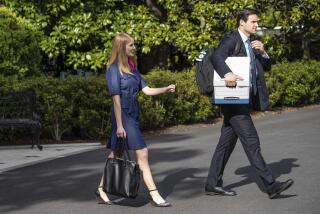Hillary Clinton’s Credibility Takes Hits at Hearing
- Share via
WASHINGTON — The credibility of First Lady Hillary Rodham Clinton came under fresh attack Wednesday at a House hearing where newly released White House documents, and the testimony of a former presidential aide, appeared to conflict with her statements that she had no direct role in the 1993 firing of White House travel office employees.
Memos and handwritten notes turned over to the House Government Reform and Oversight Committee by David Watkins, the president’s director of administration at the time, said Hillary Clinton thought that a close friend of the Clintons, Hollywood producer Harry Thomason, should be given the opportunity to take over the travel office.
“Harry says his people can run things better; save money, etc.,” Watkins quoted the first lady as saying. “And besides, we need those people out. We need our people in. We need the slots.”
But under questioning Wednesday by Democrats on the Republican-controlled committee, Watkins said “it was my decision to terminate the travel office employees” and that “the first lady did not direct me to fire them.”
Hillary Clinton has denied that she ordered the May 1993 dismissals of all seven employees of the office that handles travel arrangements for the White House press corps. The White House later said the action was ill-advised.
The first lady has insisted she merely expressed concern about reports of financial mismanagement in the office and she has speculated that such expressions may have been misinterpreted by others who believed she wanted the entire office staff fired.
At Wednesday’s hearing, committee Democrats, led by Henry A. Waxman of Los Angeles, attacked the purpose of the hearing. Waxman contended there were no illegalities involved in dismissing the employees because “everyone in the White House serves at the pleasure of the president.”
Joining Waxman, Rep. Carolyn B. Maloney (D-N.Y.) told Rep. William F. Clinger Jr. (R-Pa.), the panel chairman, that “these unwarranted attacks on the first lady’s character” represent just “one more shot in the developing 1996 presidential campaign.”
In his testimony, Watkins told the committee that Hillary Clinton’s wishes for “quick and decisive action” were communicated to him by Thomason as well as by the late Deputy White House Counsel Vincent Foster.
In handwritten notes dated May 31, 1993, Watkins wrote that on May 12--seven days before the firings--Thomason told him “he bumped into Hillary and she’s ready to fire them all that day.”
Watkins wrote that two days later, in a conversation with Foster, he “says he’s getting more pressure from first lady to act. . . . First lady says she thinks these people should be out.”
Earlier this month the White House released a memo, dated in the fall of 1993, in which Watkins wrote “there would be hell to pay” unless the first lady’s wishes were followed.
Interviewed Wednesday by CNN in Ann Arbor, Mich., Hillary Clinton reiterated she merely had expressed concern about financial irregularities. “I did not have a hand in making the decision” on dismissals, she said. “That was not my responsibility.”
Clinger and other Republicans said the travel office shake-up was engineered by Thomason and Hillary Clinton in an effort to get air charter business for a company in which Thomason had an interest. Watkins said Billy R. Dale, fired as White House travel director, had rejected efforts by Thomason to obtain a share of White House press corps travel business.
Some major allegations raised by Thomason, including that travel office workers were demanding kickbacks, never were proven. An outside review by the accounting firm of Peat Marwick uncovered sloppy bookkeeping, but a criminal trial of Dale on embezzlement charges resulted in his acquittal last year.
Foster’s suicide in July 1993 is still being investigated by the Whitewater independent counsel. White House aides quickly sealed off his office, which included papers on the Clintons’ Whitewater real estate investment and files on the travel office controversy.
Watkins was among several White House employees who received reprimands for precipitous and unwise action in dismissing the travel office workers, all but one of whom was offered other government jobs. Watkins himself, a former Little Rock, Ark., advertising director, later was fired for taking a White House helicopter to play golf in suburban Maryland.
More to Read
Sign up for Essential California
The most important California stories and recommendations in your inbox every morning.
You may occasionally receive promotional content from the Los Angeles Times.













